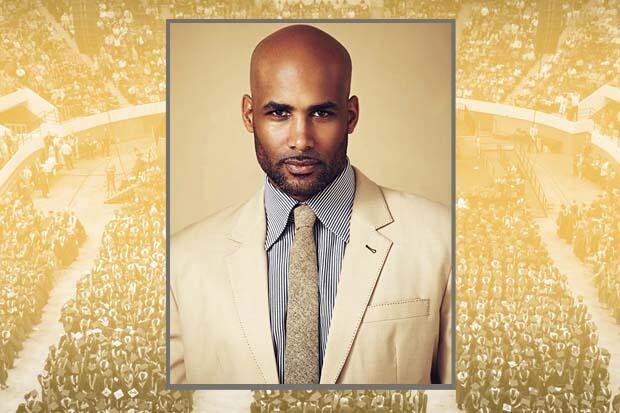
May 4, 2018
As he prepares to speak at commencement, Boris Kodjoe recalls his road from VCU to Hollywood
Share this story
In 27 years as head tennis coach at Virginia Commonwealth University, Paul Kostin has just about seen and heard it all. He’s coached hundreds of players of varying abilities and personalities, and they have challenged him in seemingly infinite ways. Still, he has only encountered one Boris Kodjoe, and he has never faced a conundrum quite like the one Kodjoe brought to him one spring day in 1996.
Kodjoe appeared depressed when he entered Kostin’s office that day. A superb competitor in both singles and doubles, Kodjoe was nearing the end of a Rams’ career that would place him among the most successful VCU players ever. So Kostin was stunned when Kodjoe sheepishly asked if he could miss the team’s upcoming match with Clemson University.
Kodjoe wanted to be on the court with his teammates, he said, but he also wanted to attend a music video awards show in New York. Kodjoe wasn’t just looking for some random fun night out. While acing the rigors of a student-athlete’s life at VCU, Kodjoe had also carved out a promising modeling career that already saw him traveling in rarefied circles. He had been a breakout star in the recent video for TLC’s song, “Red Light Special,” a top awards contender, and the upcoming show would offer him an invaluable moment in the spotlight.
Few Division I athletic coaches likely would have even considered the request, but Kostin knew the event was a unique opportunity for a student whose star was rising fast outside of tennis. Also, he said, it was hard to say no to this particular player. So he reluctantly agreed to excuse him.
“I could never get mad at Boris because he was such an exceptional person and so unselfish as a player and a teammate,” Kostin said. “He deserved to go. It also was clear he was going places and I didn’t want to get in the way of that.”
In the years since that meeting, Kodjoe has staked out an accomplished career as an actor with dozens of credits that span film (“Downsized,” “Ferdinand”), TV (“The Last Man on Earth,” “Real Husbands of Hollywood”), and theater (“Cat on a Hot Tin Roof”). He’s currently starring as Dr. Will Campbell on “Code Black,” a medical drama on CBS.
Kodjoe, who was born in Austria and raised in Germany, points to his time at VCU as a critical phase in the personal growth that led to his professional success. His peers and mentors, he said, were always quick to support him beyond the tennis court.
“I was empowered at VCU,” he said. “I cannot overstate how important that period was in my life.”
On May 12, Kodjoe will return to Richmond to deliver the commencement address at VCU’s spring graduation ceremony at the Richmond Coliseum. Kodjoe said the offer to serve as the featured speaker was “completely unexpected.”
“I was very emotional about it,” he said. “And very honored.”
Having once sat in the seats where this year’s graduates will be, he said he has been reflecting on that moment in his life — a day when “I felt as though I had the whole world at my feet.” Since receiving the invitation to speak, Kodjoe has also been considering how far he came during his four years at VCU and all that has happened in the decades since then.
“It’s been quite a journey,” he said.
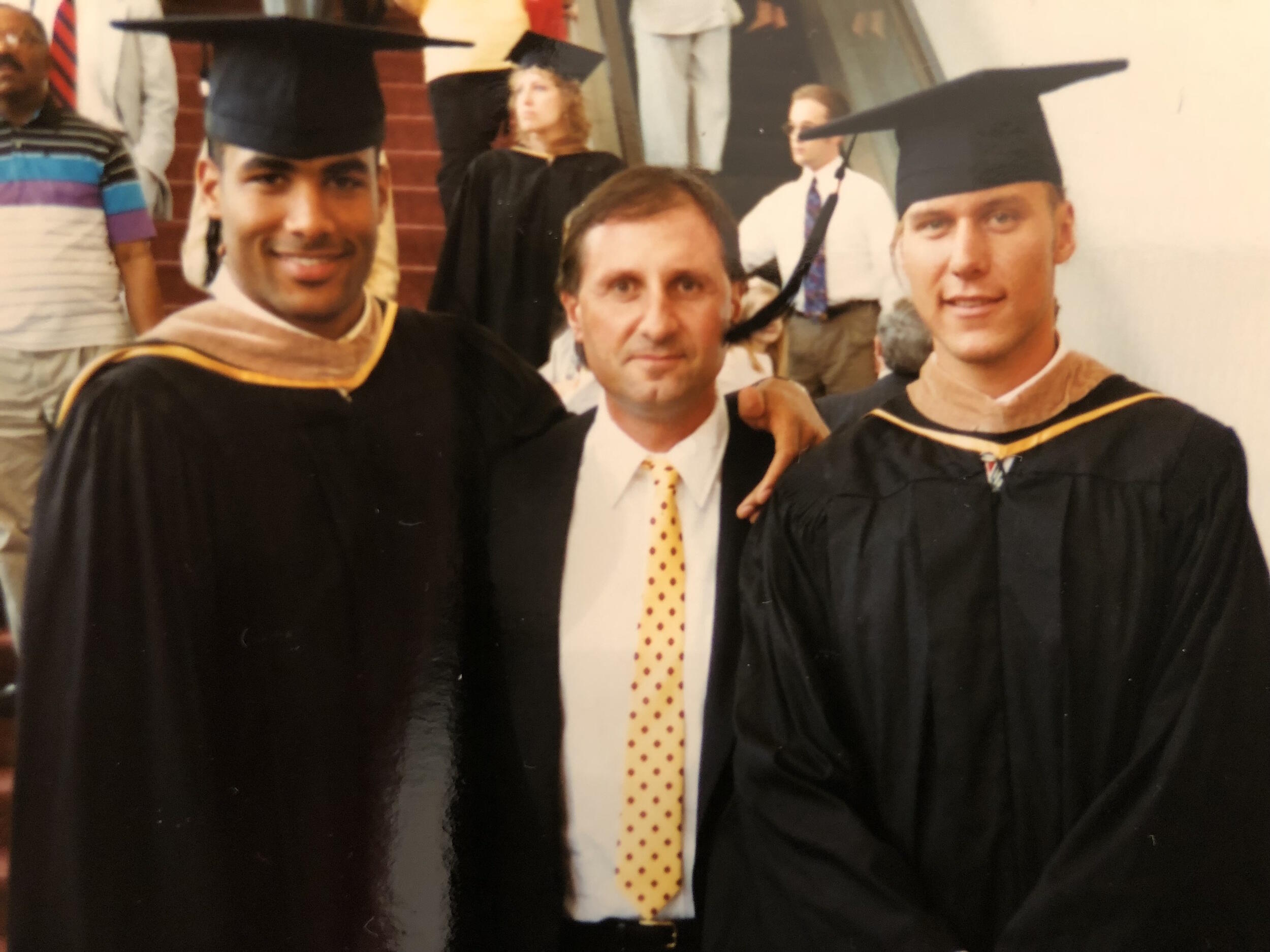
Lost in translation
Kodjoe arrived in Richmond as a promising tennis player with a strong academic background and little knowledge of English. It was a difficult adjustment. Kostin remembers a certain initial “cluelessness” from Kodjoe in those days, owing to the freshman’s unfamiliarity with the United States and his struggle to communicate. Kodjoe remembers that, too.
“There were challenges that I had to overcome,” Kodjoe said. “The first couple of months I couldn’t understand a word anybody was saying to me. I was just walking around and listening to these voices that I didn’t understand. It was a very different culture, very different behaviors and very different people.”
Fredrik Eliasson, a junior on the tennis team at the time, said Kodjoe seemed “very green.” Kodjoe stayed with Eliasson and some other upperclassmen his first few nights in the city in an apartment on West Franklin Street as he grew accustomed to his new environment.
“I think it was very overwhelming for him at first,” Eliasson said. “But then he settled in very, very quickly after that. He adjusted very fast to what he had to do.”
Once Kodjoe found his footing, he began to excel on the court, in the classroom and everywhere else on campus. Jonas Elmblad was Kodjoe’s roommate as a freshman. A fellow international student and tennis player, Elmblad came to VCU by way of Stockholm.
Elmblad and Kodjoe spent much of their freshman year together — and then much of the subsequent three years together, too. Referred to as “the twins” by teammates and others because they were so inseparable, Elmblad and Kodjoe both majored in marketing in the School of Business and frequently had identical class schedules, along with their lockstep practice and competition calendars. They eventually would team to become one of the winningest doubles pairs in school history and were ranked No. 23 in the country in 1996.
Elmblad remembers with a particular fondness their frequent walks that first year from Gladding Residence Hall to the dining center, which was located in Hibbs Hall at the time, and the in-depth conversations the two new friends would manage despite their limited English. They tended to attract attention along the route.
“He was tall and black, and I was tall and white with long blond hair, so we stood out together walking through campus,” Elmblad said. “Though I guess with Boris, it didn’t really matter who was walking next to him — he always stood out.”
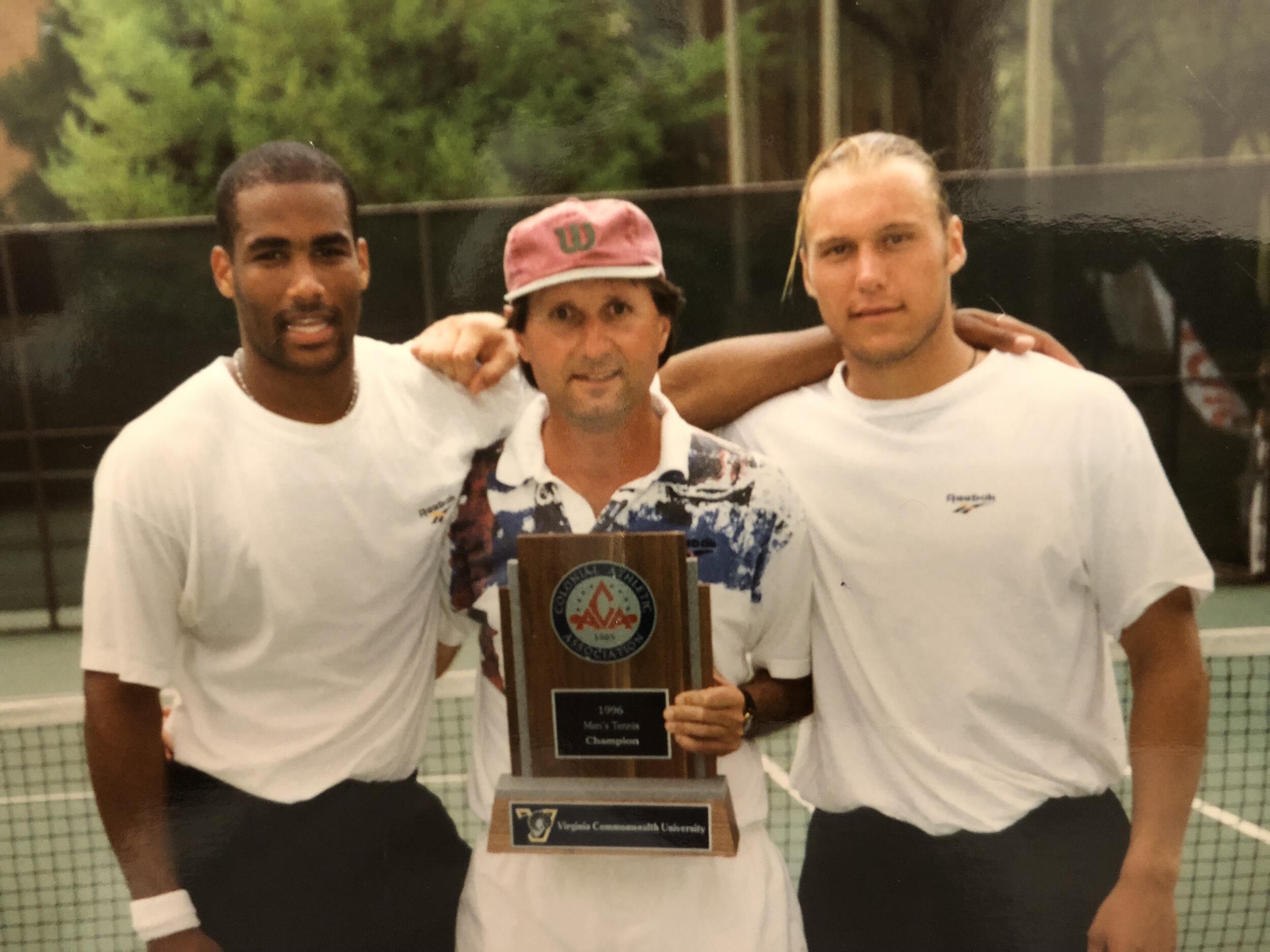
A beautiful game
On the court, Kodjoe featured an aesthetically appealing tennis game that was a natural match for his fashion-model looks. Kostin compared the beauty of Kodjoe’s game to that of Roger Federer.
“He just looked perfect playing tennis,” said Eliasson, who is second all-time at VCU with 99 career singles wins. “He was incredibly technically sound.”
Elmblad said he and Kodjoe were an aggressive pair together on the doubles court, rangy and athletic and forever in attacking mode. He said they reveled in rallying from dire deficits to notch dramatic comeback wins.
“We had this mindset that we were never going to give up on anything,” Elmblad said. “It was a lot of fun.”
Although Kodjoe was a serious competitor on the court who wanted to win badly, Eliasson said he never seemed to let losses linger for too long.
“I think that’s a sign of someone who has good balance in his life,” Eliasson said. “He always had that.”
Also a sign of Kodjoe’s steady demeanor, Kostin said, was his unfailing willingness to take responsibility.
“He was never one to make any excuses. Ever,” Kostin said. “That’s rare for a young athlete, but it’s extremely important.”
Between Kodjoe’s looks, charisma and talent, Eliasson said his teammate “had a lot of things going for him.” Still, even as Kodjoe became a popular figure on campus, Eliasson said he never betrayed signs of arrogance.
“He was very grounded and a great teammate. Very unselfish,” Eliasson said. “For us, he was just always one of the guys, and we gave him a hard time just like we gave everybody else on the team.”
A model emerges
Kodjoe was good enough on the tennis court to harbor aspirations of giving the professional tour a try. He still ranks 12th in singles wins (75) and third in doubles wins (66) on the career lists at VCU. Kostin said he believes Kodjoe possessed enough talent and determination that he might have been able to find success as a pro. However, Kodjoe began to experience recurring back problems during his junior year, and his prospects for pursuing a demanding pro career diminished.
Fortunately, Kodjoe demonstrated a curiosity and drive to succeed outside of tennis from the outset, Kostin said.
“When he came here, it was never just about playing tennis for him,” Kostin said. “He wanted to be something. I don’t think he necessarily had visions of being a movie star, but he always had high ambitions for being successful.”
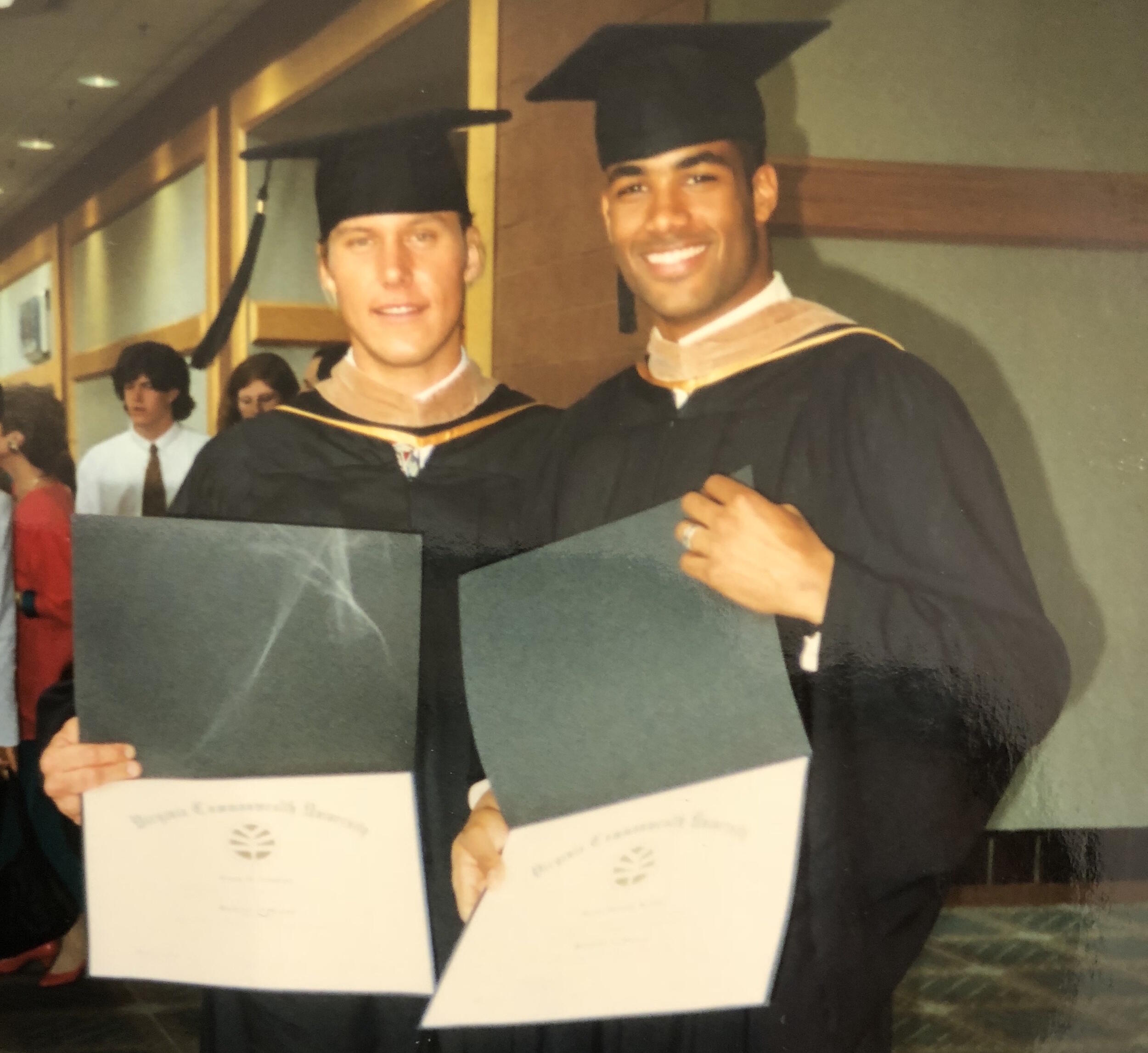
Kodjoe signed with the vaunted Ford Models agency while he was still an undergraduate and traveled frequently during his senior year to modeling gigs. Elmblad said Kodjoe handled his dizzying schedule and diverse responsibilities calmly, never revealing any signs of stress or complaining about his many duties. He also remained humble even as his career took off.
“It was not something that he would talk about a lot,” Elmblad said. “He’d go do these amazing things on the weekend but when he saw us on Monday he wouldn’t start talking about what he’d done on Saturday night or tell us about what celebrities he’d hung out with. He’d just be like he’d always been. He never let it get to him that way."
By the time Kodjoe’s graduation arrived in May 1996, he was already residing part time in New York because he was in such high demand as a model. In fact, his graduation day went down in family lore as a near-disaster because of his career obligations. Kodjoe narrowly caught his flight out of New York the morning of commencement and barely arrived at the ceremony in time for the procession — to the relief of the large gathering of family members who had traveled from Europe to be there.
“That was a huge moment of panic for me,” Kodjoe said. “My mother would have killed me.”
Searching for his role
Following graduation, modeling would take Kodjoe around the world on compelling projects and give him an opportunity to experience a range of cultures and work with people of all nationalities, interests and abilities. During that period, he said he felt free to try new things and test himself in unexpected ways.
Kodjoe knows he was fortunate to have the safety net of his modeling career in those days, but he emphasizes that not everything he tried hit the mark. It’s a message he hopes this year’s class of new graduates understands.
“Failure is the only way to success,” he said. “It’s the only real way to get there. … I think that should be the motto of the first 10 years after college: Make mistakes over and over again.”
A desire to shake his German accent led Kodjoe to an acting class. Soon, he was hooked on the craft. He booked a few early roles before landing a starring part in the TV drama “Soul Food,” which ran for five critically acclaimed seasons on Showtime. Kodjoe was nominated three times for an NAACP Image Award for his work on the show.
The role lifted Kodjoe to new heights of fame — he was named one of People magazine’s Most Beautiful People in 2002 — and led to new prominent parts. Kodjoe also met his wife, actress Nicole Ari Parker, on the show. The couple now has three children.
Kodjoe said his family is his top priority and helps him manage the ups and downs that mark a career in Hollywood.
“When you have a life, when you have people who care about you, you don’t become a victim of this constant search for validation from people who don’t care about you at all,” Kodjoe said. “That can be a very lonely existence, and it breaks down a lot of people in this business.”
Elmblad said Kodjoe’s looks and easygoing nature with people can make his path to success seem painless, but he said his friend has had to work to find his place professionally.
“He puts so much effort into everything that he does,” Elmblad said. “I just think about how hard he has had to work with the language and his accent and how far he’s come. Everything he does is with a purpose. He’s always been working hard behind the scenes.”
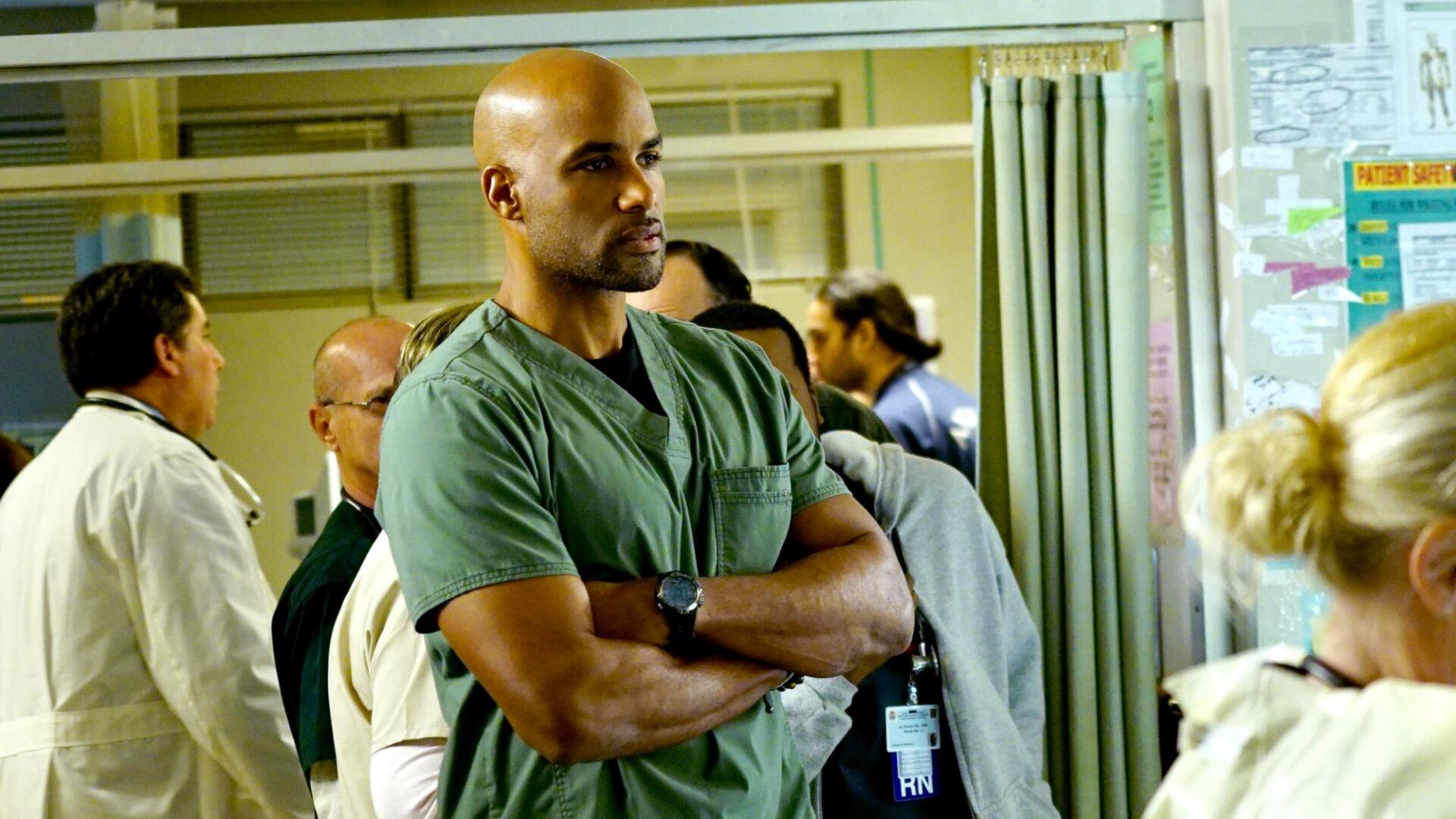
Taking his best shot
Kodjoe expresses enthusiasm for his current work on “Code Black,” and for what future projects might await. He said he gets most excited for roles that surprise him or take him in unfamiliar directions. The key, he said, is to be ready for them.
For instance, Kodjoe remembers his reluctance to fly to Toronto for an audition for the TV show “Undercovers,” a series about a globetrotting husband-and-wife secret-agent team that was being produced by hit-maker J.J. Abrams. Kodjoe thought he didn’t fit the type the showrunners wanted, and he assumed the part would go to a white actor. However, he took the trip, performed the dialogue for his audition unprompted in French, German and English to show off his potential for international spycraft, and landed the starring role alongside actress Gugu Mbatha-Raw.
The series was short-lived, but Kodjoe received positive reviews and the part provided him with rare experience as the lead actor on a broadcast show. The exposure also opened new doors for him professionally.
“There’s only a certain number of great opportunities for each of us, and you’ve got to be ready to take them and go in directions that you’d never anticipate,” he said.
Kodjoe said he learned long ago to train his focus on what he could control and not grow obsessed with what he couldn’t.
“All you can control is your disposition, your attitude and the way you respond to challenges,” Kodjoe said. “This is a beautiful life, but you’ve got to be open and you’ve got to be spontaneous and you’ve got to be flexible.”
A key part of that control, Kodjoe said, is seeking out opportunities to grow and evolve. He points to his big break on “Soul Food,” when he sought out just about every member of the cast and crew during his four years there to learn about their work in an attempt to strengthen his understanding of the full spectrum of responsibilities on a show. That extra effort put him in the position to serve as a producer on his next project.
Elmblad said Kodjoe’s interest in other people and his eagerness to engage with them has remained a constant to his personality — and reminds Elmblad of Kodjoe’s ease connecting with others at VCU.
“I’ve been with him several times on set now and he knows everybody and talks to everybody,” Elmblad said. “The makeup people, the people working in the trailers, he wants to know how everybody is doing.”
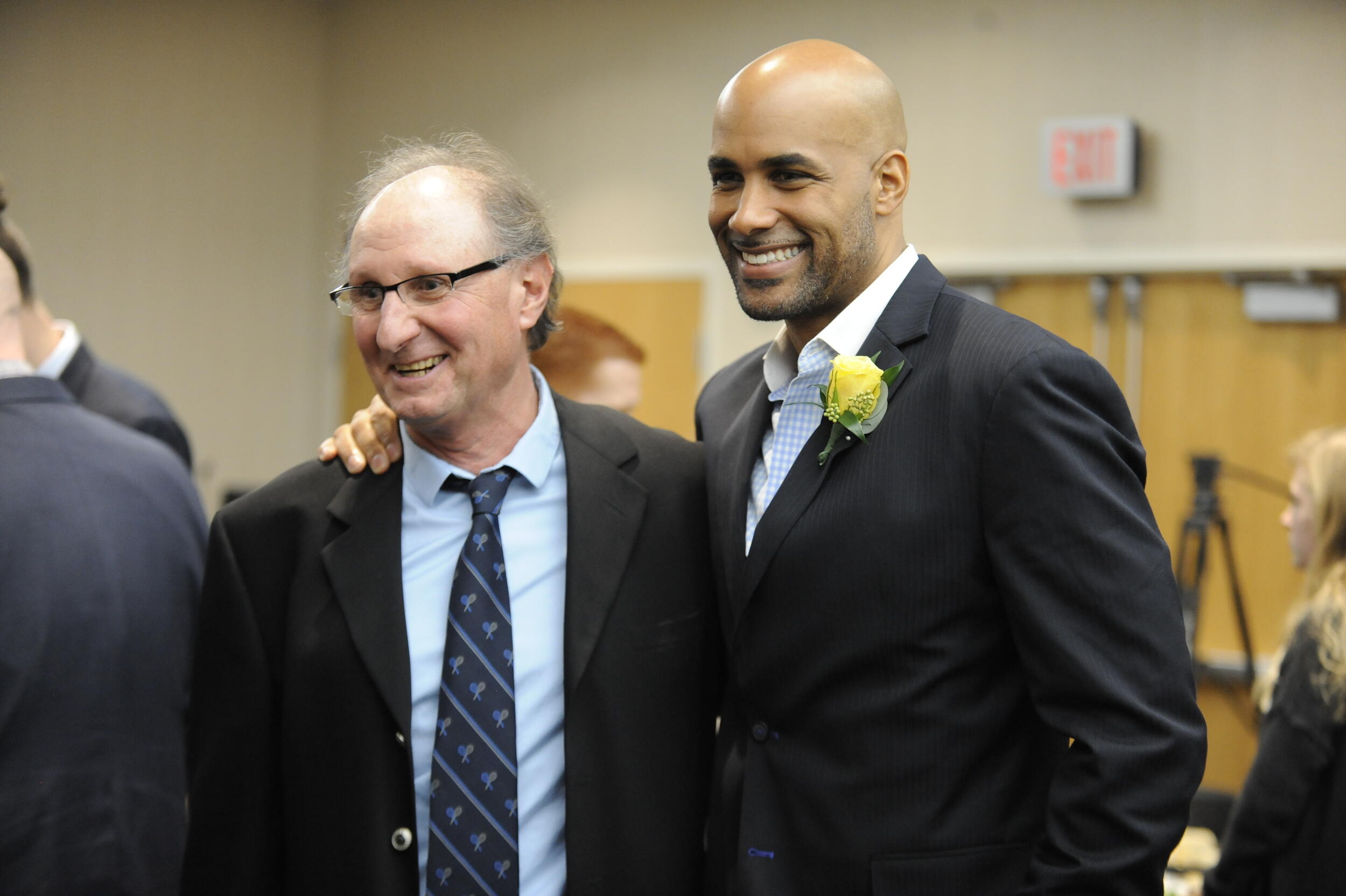
Back on campus
Decades ago, when Elmblad and Kodjoe were a couple of freshmen strolling through Monroe Park to eat dinner at Hibbs, holding conversations in their still-developing English, Elmblad never considered the possibility that his “twin” would one day be a Hollywood star. It wasn’t something they ever talked about. Still, if someone had told Elmblad that stardom awaited his friend, he said he wouldn’t have blinked.
“With Boris, no, I wouldn’t have been surprised at all,” Elmblad said. “You knew he was going to do something great.”
Kostin agrees, saying the years Kodjoe was a part of his team will always remain “unforgettable” to him.
“He was just always exceptional,” Kostin said. “It’s hard to put into words.”
For his part, Kodjoe speaks with reverence about Kostin and the influence the coach had on him and his teammates. He still appreciates that Kostin never treated him as just an athlete who was there solely to win matches.
“We were blessed with a mentor, a father figure as our coach. He was someone who took the time to get to know each of us and to help us on our specific path,” Kodjoe said. “That’s just tremendously valuable. And I will never forget that.”
Kodjoe has returned to campus several times since his graduation, including last year when he was inducted into the VCU Sports Hall of Fame. But he said he feels particularly excited to be back for commencement this year and to be part of a memorable day for thousands of new VCU graduates. After all, he was once one of them.
“I wouldn’t change anything about my journey because it’s led me to this point right now, where I get to give the commencement speech at my alma mater to young people about to go do something great,” Kodjoe said. “That’s amazing to me.”
Subscribe to VCU News
Subscribe to VCU News at newsletter.vcu.edu and receive a selection of stories, videos, photos, news clips and event listings in your inbox.






